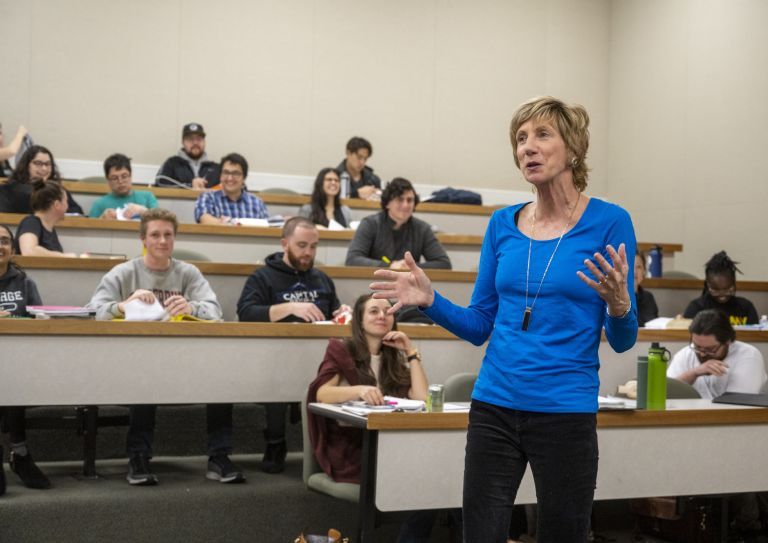What is the Office of Student Conduct and Community Standards mission?
The mission of the Student Conduct and Community Standards Office is to support Pacific's mission by reviewing and resolving alleged violations of the Student Code of Conduct and University Policies in a fair, honest, and socially just manner that honors the needs and protects the safety of individual students and the Pacific community. Foundational to our work is the education of students through prevention, intervention, and leadership opportunities. What does the Office of Student Conduct and Community Standards provide to Pacific faculty and staff?
What does the Office of Student Conduct and Community Standards provide to Pacific faculty and staff?
• Assistance addressing concerns presented by individual students and recognized student organizations
• Interpretation of the Honor Code, Student Code of Conduct, and other University Policies
• Consultation regarding student conduct issues and informal/formal options for resolution
• Explanation and guidance for navigating the student conduct processes and general timeline for case adjudication
• Proctoring of exams and communication of academic integrity expectations to your class
Importance of Reporting Academic Violations
If you suspect or have evidence of cheating or plagiarism, we encourage you to discuss the matter with the student AND report it to the Student Conduct Office. Please be sure to include any supporting documents, including but not limited to: class syllabus, e-mail correspondence, and a copy of the paper, exam or other documents related to the alleged academic honesty violation. Ensuring academic honesty is an essential part of maintaining the integrity and value of the education we provide and the degrees we award at University of the Pacific. Taking action and centrally reporting academic honesty violations is vital to this effort. It is not uncommon for a student found to have committed an academic honesty violation to also have committed other policy violations. Reporting ensures early intervention and an opportunity to educate the student and prevent future violations.
Please click here to access the online Honor Code Report Form
The Office of Student Conduct and Community Standards has several resources available to faculty and staff members, including the Tiger Lore Student Handbook.
Honor Code
The Honor Code at the University of the Pacific calls upon each student to exhibit a high degree of maturity, responsibility, and personal integrity. Students are expected to:
1) Act honestly in all matters;
2) Actively encourage academic integrity;
3) Discourage any form of cheating or dishonesty by others;
4) Inform the instructor and appropriate university administrator if she or he has a reasonable and good faith belief and substantial evidence that a violation of the Academic Honesty Policy has occurred.
Sanctioning
As faculty and reporter of the violation, you have a say in what the course of action taken by the Student Conduct Office. The report form provides you with a place to indicate what action(s) you have taken and what further action(s) you would like taken, including "no further action". In some cases, prior violations of University policy by the student may result in more serious sanctioning than requested by faculty.
Sanctions for academic honesty violations often include referrals to campus resources. For example, a student found responsible for plagiarism may be sanctioned to re-write the paper (for no credit) with the help of the Writing Center Tutor. Students may also be referred to Student Advising to address issues of time management, test preparation and study skills or to the Counseling Center to address personal issues that may be affecting their academic performance and decision-making.
Communicating Expectations
The Student Conduct Office is available to speak to your class at the start of the semester to discuss the importance of academic honesty and the potential consequences associated with a violation. Please contact the office for additional information.
Proctors
The Student Conduct Office can assist with proctoring of exams. Contact the Student Conduct Office with the date(s), time(s), and number of proctors you need. Early notice is helpful to ensure we are able to accommodate your needs.
Cheating Prevention
- Require students to turn off cell phones and put away notes, books, and all electronic devices inside their backpacks and have their desk or table clear.
- Require students to put all bags and backpacks at the front of the classroom during an exam.
- Prohibit talking or other communication during exams. Questions must be directed to you.
- Do not allow students to leave exam room without permission and have them turn in their exam while they are gone.
- Allow only one student at a time to leave to use the restroom.
- Use test formats requiring short-answers, essays, or problem solving, rather than multiple choice.
- Use two or more exam versions, scrambling the order of questions or answers, or changing key variables or terms; use different colored paper for each version, so you can prevent students sitting adjacent to one another from having the same version.
- Give no credit for correct answers, unless all work is shown.
- If other tools such as calculators are needed provide them to the students for the exam.
- Use alternate seating and spaced seating as much as possible.
- Have students remove and put away hat and sun glasses.




